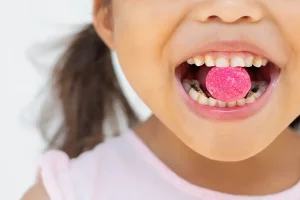Have you ever woken up with a sore jaw, aching teeth, or an unexplained headache? You might be grinding your teeth at night while you sleep. Many people experience teeth grinding, technically known as bruxism, often without even realizing it. Nighttime teeth grinding can cause severe damage to your teeth and jaw over time. Let’s take a closer look at what causes teeth grinding, how to spot the signs, and most importantly, what you can do to stop it.
What is Teeth Grinding?
Teeth grinding, also known as bruxism, is an involuntary habit in which individuals clench or grind their teeth, often during sleep. Many people are unaware that they are grinding their teeth until they start to experience symptoms. Signs that you may be grinding your teeth include dull headaches, jaw soreness, facial pain, worn enamel, and even cheek or tongue damage from biting. In some cases, the sound of grinding can even be loud enough for others to hear.
Common Causes of Teeth Grinding
While there isn’t a single reason why people grind their teeth at night, it is often due to a combination of factors. Some of the most common causes include:
- Stress and anxiety – emotional tension is one of the leading causes of bruxism
- Sleep disorders – sleep conditions like sleep apnea are frequently linked to teeth grinding
- Bite misalignment – if your teeth don’t have proper alignment, your jaw may try to correct it by grinding
- Lifestyle habits – Habits like drinking caffeine or alcohol and smoking can make grinding more likely, and certain medications, particularly antidepressants, may contribute to the issue.
How to Stop Grinding Your Teeth at Night
The million-dollar question – and most likely the main reason you’re reading this blog! The good news is that there are proven ways to reduce or eliminate nighttime teeth grinding and to protect your teeth.
- Wear a Mouth Guard – These devices are designed to provide a buffer between teeth to help prevent tooth damage caused by grinding. At Eubanks Family Dental, we create custom mouthguards to offer the most comfortable fit and optimal protection for our patients.
- Reduce Stress & Anxiety – Stress and anxiety are primary triggers for teeth grinding, so finding ways to relax before bed, such as meditation, deep breathing, or journaling, can help reduce grinding while you sleep.
- Practice Good Sleep Habits – Stick to a regular sleep schedule, avoid screens before bed, and create a calming bedtime routine to help improve the quality of your sleep.
- Address Deeper Issues – If a misaligned bite or sleep apnea is contributing to your bruxism, your dentist or doctor can help recommend the proper treatment, such as orthodontics or a sleep study.
Don’t Let Grinding Wear You Down
Teeth grinding can quietly damage your teeth, your jaw, and your sleep, but it doesn’t have to. If you suspect you’re grinding your teeth at night, schedule an appointment with the Eubanks Family Dental team. We’ll help identify the cause and create a personalized plan to protect your smile for the long run. Ready to take the next step towards relief? Contact us today to schedule a bruxism evaluation or to learn more about custom night guards specifically designed for you.




